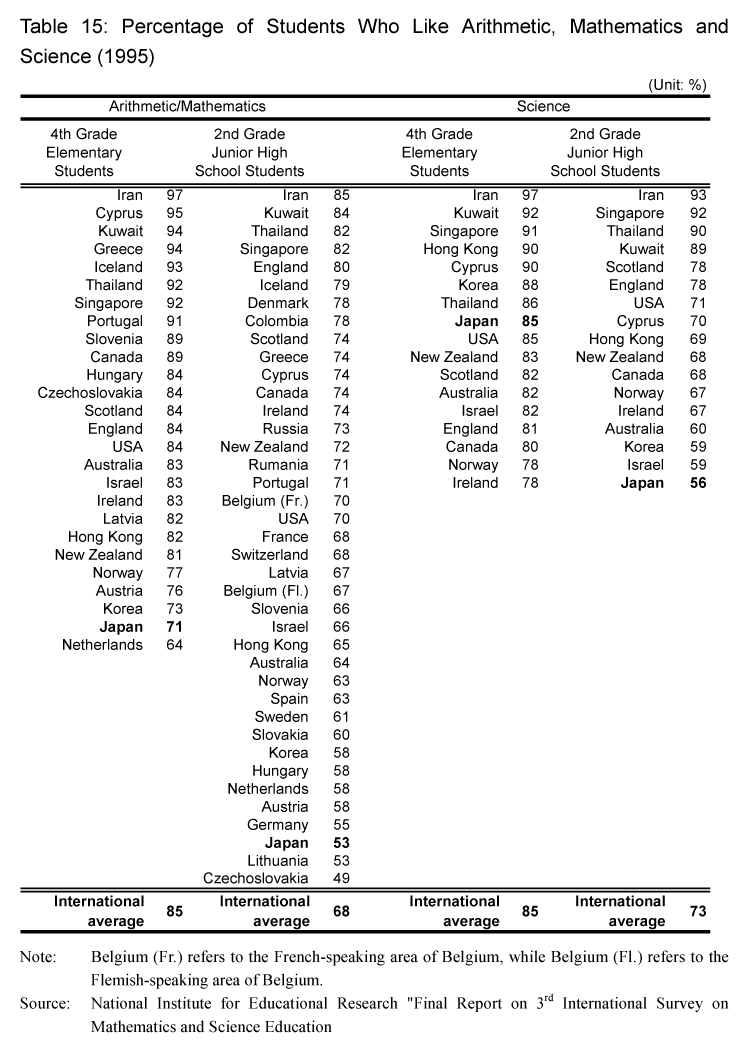| Home > Policy > White Paper, Notice, Announcement > White Paper > Annual Report on the Promotion of Science and Technology 2000 > Part1 Chapter3 Section2 4 | ||
![]() Because all members of the public must play a part in a knowledge-based
society, it is desirable that education be enhanced as the best opportunity to
acquire basic knowledge concerning science and technology, and that the opportunities
be enhanced for adults who have completed their education to obtain knowledge
about ever-developing science and technology.
Because all members of the public must play a part in a knowledge-based
society, it is desirable that education be enhanced as the best opportunity to
acquire basic knowledge concerning science and technology, and that the opportunities
be enhanced for adults who have completed their education to obtain knowledge
about ever-developing science and technology.
![]() Focusing on the today's young people who will be responsible
for the 21st century, recently problems such as the drop in academic ability
and the shift away from science and technology are frequently brought up.
Focusing on the today's young people who will be responsible
for the 21st century, recently problems such as the drop in academic ability
and the shift away from science and technology are frequently brought up.
![]() According to an international comparative survey conducted
in 1995, the average academic ability of Japanese junior high school students
in mathematics and science still remains at a top level, but it is evident that
awareness of these subjects is low ( Table
15 ). Recently this awareness is also dropping even further.
According to an international comparative survey conducted
in 1995, the average academic ability of Japanese junior high school students
in mathematics and science still remains at a top level, but it is evident that
awareness of these subjects is low ( Table
15 ). Recently this awareness is also dropping even further.

![]() It is pointed out that the mean academic ability of today's
university students is lower than the past, and that in general the desire, interest,
motivation and attitude towards learning are also lower than the past.
It is pointed out that the mean academic ability of today's
university students is lower than the past, and that in general the desire, interest,
motivation and attitude towards learning are also lower than the past.
![]() Museums and science centers must be developed and enhanced
in both quality and quantity as bases in which various citizens are able to have
hands-on experience about science and technology by incorporating advanced exhibits
which adults can also enjoy, as well as projects which children can have interest.
Museums and science centers must be developed and enhanced
in both quality and quantity as bases in which various citizens are able to have
hands-on experience about science and technology by incorporating advanced exhibits
which adults can also enjoy, as well as projects which children can have interest.
![]() Opening up universities and research institutes to the general
public is also an effective ways to increase opportunities for people to come
into contact with science and technology information.
Opening up universities and research institutes to the general
public is also an effective ways to increase opportunities for people to come
into contact with science and technology information.
![]() In order to give children an interest in science and technology,
it is necessary to incorporate experiments and hands-on learning to the classes
in elementary and secondary education, to foster the ability to learn for oneself,
and to develop problem-solving ability.
In order to give children an interest in science and technology,
it is necessary to incorporate experiments and hands-on learning to the classes
in elementary and secondary education, to foster the ability to learn for oneself,
and to develop problem-solving ability.
![]() It is also necessary to work towards creating a situation
in which teachers can come into contact with leading-edge science and technology,
and to promote improvements and innovations to teachers' instruction methods.
To do so it is important to expand the training opportunities for teachers.
It is also necessary to work towards creating a situation
in which teachers can come into contact with leading-edge science and technology,
and to promote improvements and innovations to teachers' instruction methods.
To do so it is important to expand the training opportunities for teachers.
![]() There is also a need for university education to fuse the
humanities and sciences, and it is necessary to enhance the educational activities
and organizations not only relating to natural sciences but also relating to
human and social sciences.
There is also a need for university education to fuse the
humanities and sciences, and it is necessary to enhance the educational activities
and organizations not only relating to natural sciences but also relating to
human and social sciences.
| Back to Top | MEXT HOME |